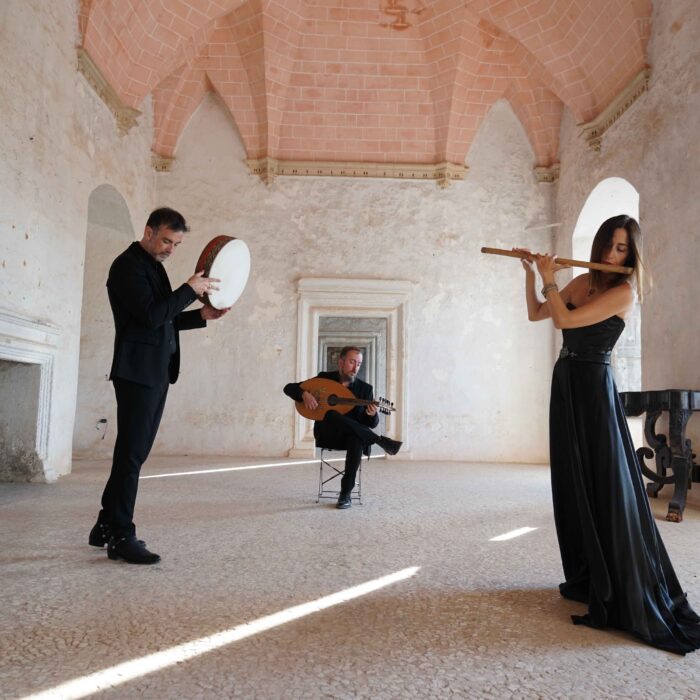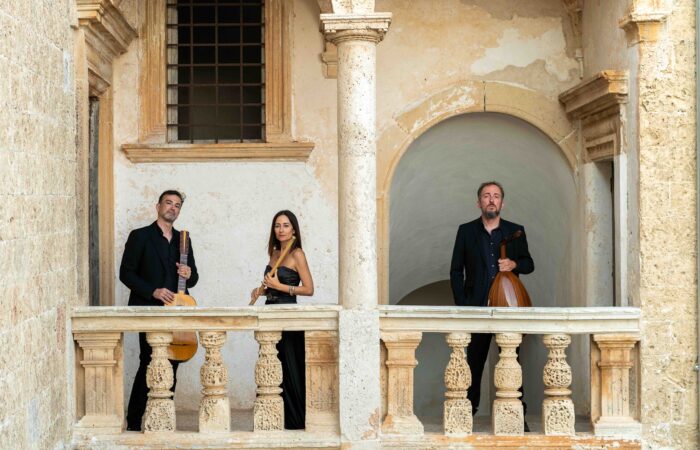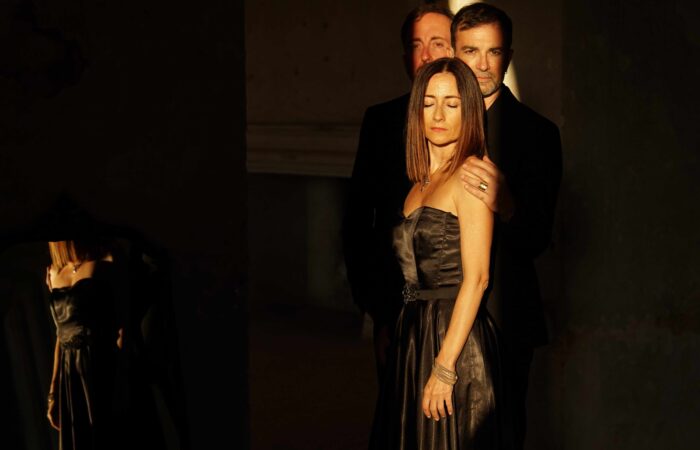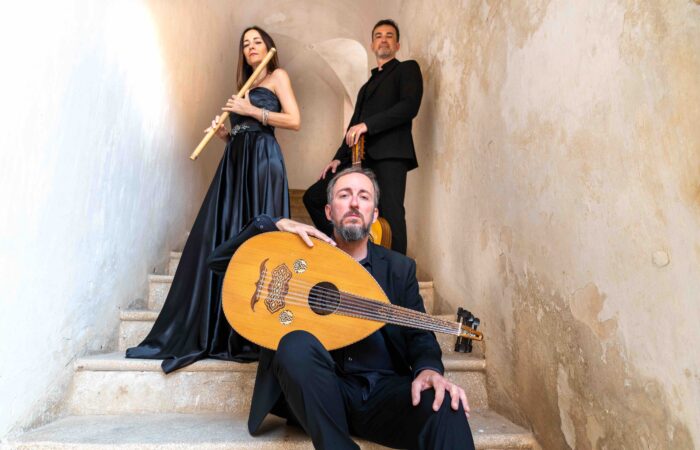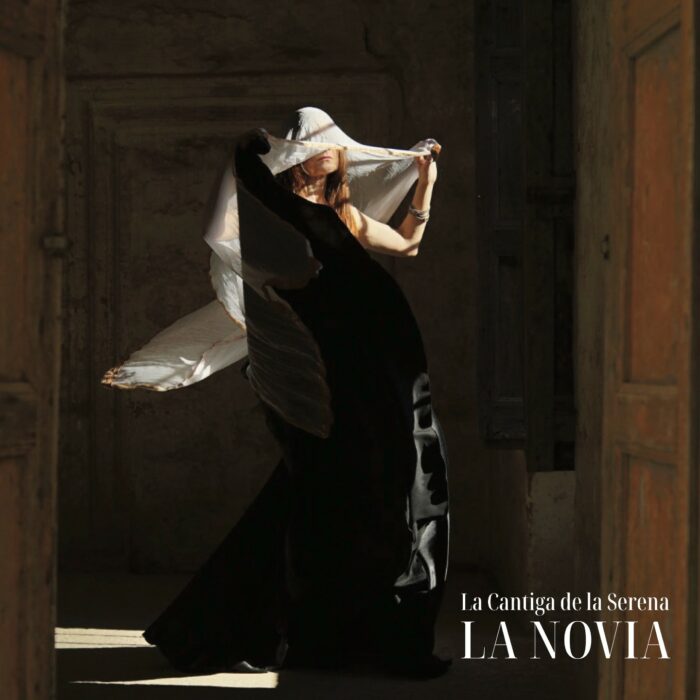La Cantiga de la Serena è un ensemble di musicisti e ricercatori pugliesi che da anni si dedica al recupero ed alla rielaborazione della musica antica e tradizionale del bacino del Mediterraneo, vero e proprio ponte culturale tra Occidente e Oriente. Un viaggio millenario nella musica del Mediterraneo tra i ritmi ipnotici della tarantella del sud Italia, le ammalianti melodie ebraiche, i tempi dispari della musica mediorientale.
Il trio esegue questo repertorio utilizzando strumenti che appartengono a diverse culture musicali, lasciando ampio spazio ai momenti improvvisativi, alla libera espressione del proprio modo di sentire questi antichi canti di amore e preghiera.
Il trio formato da Giorgia Santoro, Fabrizio Piepoli e Adolfo La Volpe, nel 2023 pubblica per l’etichetta discografica Zero Nove Nove, il nuovo album “La Novia”.
Dopo “La Serena” (2016), “La Fortuna” (2019) e “La Mar” (2021), il nuovo progetto rappresenta l’ennesimo frutto di questo continuo lavoro di ricerca ed esplorazione portato avanti dal trio per riproporre, in una chiave nuova e personale, un repertorio che promuove il dialogo musicale e culturale tra Occidente e Oriente. La sempre presente tradizione sefardita – espressione della cultura e delle tradizioni degli ebrei spagnoli – dialoga con canti, romanze e tarantelle appartenenti a culture ed epoche differenti, proponendo un equilibrio inedito tra innovazione e tradizione.
Le radici pugliesi rappresentano il braccio di un compasso fisso al centro, che consente all’altro di tracciare una circonferenza immaginaria che idealmente racchiude tutto il bacino del Mediterraneo. Con queste premesse, il titolo scelto (La Novia, La Sposa) richiama un’immagine dal forte valore archetipico, in modo speciale nelle culture tradizionali del Mediterraneo, un simbolo dalle molte implicazioni mistiche, esoteriche e filosofiche, ma che al tempo stesso conserva nella modernità il forte impatto evocativo della promessa d’amore. Unire in matrimoni simbolici canti, lingue, storie e tradizioni diverse, dando vita a creature nuove, differenti dalle matrici che le hanno generate, è il fulcro concettuale sul quale si innesta la ricerca musicale dell’ensemble. Negli undici brani – cantati in ladino, arabo, italiano e in vari dialetti del Sud Italia – il trio è affiancato da Nabil Bey Salameh, voce dei Radiodervish, dalle Faraualla, quartetto femminile pugliese che esegue un repertorio di polifonie vocali a cappella, dal trio L’Escargot, dal violinista Francesco D’Orazio e dal percussionista e tamburellista Roberto Chiga.
English
The Salento-based trio La Cantiga de la Serena recovers and reworks the ancient music of the Mediterranean basin, which has always represented a true cultural bridge between the East and the West.
The band’s repertoire is a refined mixture of: traditional music from Puglia (‘alla stisa’ songs, lullabies, tarantella, pizzica), which is sophistically rearranged; cantigas and sephardic romances, which are expression of the tradition of the Sephardic-Jews who experienced the diaspora from Spain and Portugal in the XV century; medieval pilgrimage and devotion chants (Cantigas de Santa Maria, Llibre Vermell de Montserrat); stunning melodies and chants from the musical heritage of Provence, Al-Andalus and Portugal.
Produced by the Zero Nove Nove record label, La Novia is the fourth album by the Apulian trio. Since 2008, the ensemble, formed by Giorgia Santoro, Fabrizio Piepoli and Adolfo La Volpe has been dedicated to the recovery and reworking of ancient and traditional music of the Mediterranean basin. After La Serena (2016), La Fortuna (2019), and La Mar (2021), the new project represents, once again, the results of continued research and exploration in the work of the trio to persevere in re-proposing, in a new and personal key, a repertoire that promotes musical and cultural dialogue between West and East.
The ever-present Sephardic tradition – an expression of the culture and traditions of the Spanish Jews – communicates through songs, Spanish narrative romance ballads, and tarantellas belonging to different cultures and eras, proposing an unprecedented balance between innovation and tradition. The Apulian roots represent the arm of a compass fixed in the centre, which allows the other to trace an imaginary radius, which ideally encompasses the entire Mediterranean basin. With these premises, the chosen title (La Novia, La Sposa) evokes an image possessing high archetypal value, especially in the traditional cultures of the Mediterranean, a symbol with many mystical, esoteric, and philosophical implications, but which at the same time preserves in modernity the strong evocative impact that a promise of love holds. Combining different songs, languages, stories, and traditions in symbolic marriages, giving life to new creatures, differing from what originally generated them, is the conceptual core base on which the musical research of the ensemble is rooted. The eleven songs, sung in the Northern Italian Ladin Romance language, Arabic, Italian, and in
various dialects of Southern Italy, feature guest singers and musicians such as Nabil Bey Salameh, vocalist of Radiodervish, the Apulian female quartet Faraualla performing a repertoire of vocal polyphonies a cappella, the L’Escargot trio, violinist Francesco D’Orazio, and percussionist and tambourine player
Roberto Chiga.

